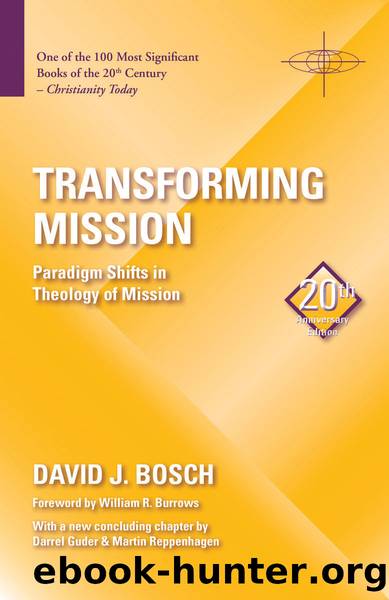Transforming Mission: Paradigm Shifts in Theology of Mission (20th Anniversary Edition) (American Society of Missiology) by David J. Bosch

Author:David J. Bosch [David J. Bosch]
Language: eng
Format: epub
Publisher: Orbis Books
Published: 2011-11-08T16:00:00+00:00
Mission and Manifest Destiny
The Western missionary enterprise of the period under discussion proceeded not only from the assumption of the superiority of Western culture over all other cultures, but also from the conviction that God, in his providence, had chosen the Western nations, because of their unique qualities, to be the standard-bearers of his cause even to the uttermost ends of the world. This conviction, commonly referred to as the notion of “manifest destiny,” was only barely identifiable during the early decades of the nineteenth century but gradually deepened and reached its most pronounced expression during the period 1880–1920. This was also the era known as the “heyday of colonialism” (Neill 1966a: 322–396; Neill actually dates the period as running from 1858 to 1914). There is undoubtedly an organic link between Western colonial expansion and the notion of manifest destiny. Still, it is valid to treat the latter as a separate motif, since it did not always express itself in colonialism (see the next section).
“Manifest destiny” is a product of nationalism which, at least in the form we know it today, is only a recent phenomenon. Although Niccolè Machiavelli may be regarded as perhaps the earliest exponent of nationalism (cf Kohn 1945:127129), the term “nationalism” was only coined in 1798 (Kamenka 1976:8). Until about 1700, neither nation nor tribe commanded the supreme loyalty and patriotism of Europe's inhabitants (:5). People found their mutual coherence primarily in their religion and their ruler. It was only after the revolution in the Western worldview precipitated by the Renaissance and the Enlightenment that the emphasis could be moved from God or king to the consciousness of a people as an organic entity (Kohn 1945:215–220). The catalytic event in this regard, profoundly permeated with Enlightenment ideas, was the French Revolution, which for the first time asserted the principle of national self-determination as the basis for a new political order (:3f; Kamenka 1976:7–11, 17f). It substituted for the king and feudal lords the notion of the people as the ultimate source of authority. The Revolution's Declaration of Human Rights formulated this in the following words, “The principle of sovereignty resides essentially in the Nation: no body of men, no individual, can exercise authority that does not emanate expressly from it.” Through the philosophical school of Romanticism, which was as much a reaction to as a consequence of the Enlightenment, these ideas were popularized in Germany and beyond. J. G. Herder submitted that it was particularly through a common language that a nation identified itself and developed its moral and political character. The concept Volk , infinitely vaguer and at the same time much more powerful than “citizenship,” was utilized by Herder and the Romanticists (Kohn 1945:331–334, 427–441). The nation-state had replaced the holy church and the holy empire.
In the course of time, these ideas were wedded to the Old Testament concept of the chosen people. The result of this was that, at one point or another in recent history, virtually every white nation regarded itself as
Download
This site does not store any files on its server. We only index and link to content provided by other sites. Please contact the content providers to delete copyright contents if any and email us, we'll remove relevant links or contents immediately.
| Adult Ministry | Children's Ministry |
| Counseling & Recovery | Discipleship |
| Evangelism | Missions & Missionary Work |
| Preaching | Sermons |
| Youth Ministry |
The Rape Of Nanking by Iris Chang(2322)
The Secret Power of Speaking God's Word by Joyce Meyer(2248)
Chosen by God by R. C. Sproul(1755)
Crash the Chatterbox by Steven Furtick(1653)
Knowing God by J.I. Packer(1429)
Habits of Grace by David Mathis(1405)
How To Be Born Again by Billy Graham(1402)
A Prophet with Honor by William C. Martin(1370)
Peace with God by Billy Graham(1313)
God's Smuggler by Brother Andrew(1217)
Confronting Christianity by Rebecca McLaughlin(1181)
Whisper by Mark Batterson(1155)
Angel Dreams by Virtue Doreen Virtue Melissa(1138)
Missionaries by Norman Lewis(1133)
The Truth War by John MacArthur(1104)
The School of Biblical Evangelism by Ray Comfort(1097)
The Poems of Rowan Williams by Rowan Williams(1068)
Do Greater Things by Robby Dawkins(1044)
Eucharistic Miracles by Cruz Joan Carroll(1016)
